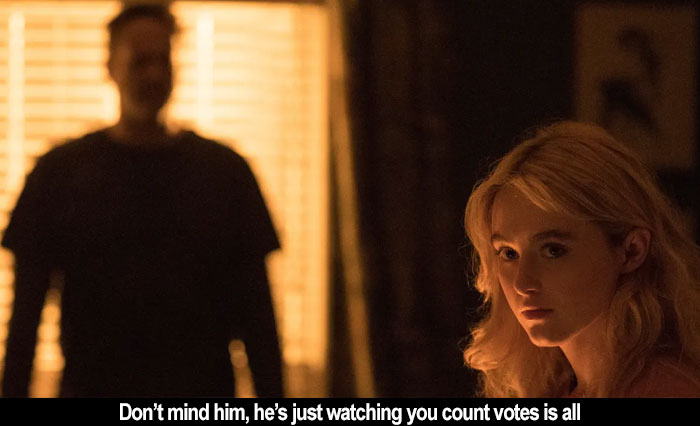
Possessor Uncut
****/****
starring Christopher Abbott, Andrea Riseborough, Rossif Sutherland, Jennifer Jason Leigh
written and directed by Brandon Cronenberg
FREAKY
**½/****
starring Vince Vaughn, Kathryn Newton, Katie Finnernan, Alan Ruck
written by Michael Kennedy & Christopher Landon
directed by Christopher Landon
Please take every precaution if you insist on risking your health and that of others to see Freaky in a theatre. Wear a mask (over the nose, too, sport), practise social distancing, and don’t be a dick.
by Walter Chaw “You’ve gone strange on me,” Ava (Tuppence Middleton) says to her boyfriend Colin (Christopher Abbott) one morning when he, frisky in the kitchen, reacts to her rejection of his advances with an expression that’s impossible to read. Colin has gone strange. He really isn’t himself. Ava is the daughter of a wealthy and powerful man, John Parse (Sean Bean), who has earned wealthy and powerful enemies, and though he’s surrounded himself with all of the things wealth can buy, including a reasonable level of separation from the rabble, he’s vulnerable to the mistakes he’s made as the bad father he knows himself to be. I appreciate that his name derives from a word meaning “parts” or, colloquially, a deconstruction of a whole into the small, individual components of which it is composed. Brandon Cronenberg’s Possessor has both nothing and everything to do with Ava and John and Colin; it is a multitude I haven’t been able to shake for days, and so I watched Possessor a second time to try to exorcise it from me. I don’t think it worked. Time will tell. Possessor is a science-fiction film the way Eternal Sunshine of the Spotless Mind is a science-fiction film, and a horror movie the way Philip Kaufman’s Invasion of the Body Snatchers is a horror movie, but what it most resembles is Kathryn Bigelow’s nightmare chimera of the two, Strange Days. All of these movies make you sick (heartsick, soulsick, sick-sick), but Possessor has about it the massive, impersonal nihilism of Philip K. Dick. We are cogs in a machine, and the machine is broken. But also it never worked in the first place. The picture is a true fable of our deconstruction.
